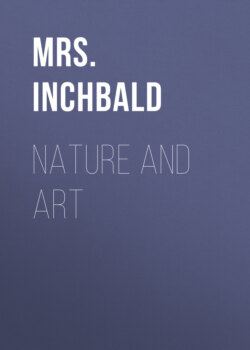Читать книгу Nature and Art - Mrs. Inchbald - Страница 9
На сайте Литреса книга снята с продажи.
CHAPTER VI.
ОглавлениеTable of Contents
As Henry despaired of receiving his brother’s approbation of his choice, he never mentioned the event to him. But William, being told of it by a third person, inquired of Henry, who confirmed the truth of the intelligence, and acknowledged, that, in taking a wife, his sole view had been to obtain a kind companion and friend, who would bear with his failings and know how to esteem his few qualifications; therefore, he had chosen one of his own rank in life, and who, having a taste for music, and, as well as himself, an obligation to the art—
“And is it possible,” cried the dean, “that what has been hinted to me is true? Is it possible that you have married a public singer?”
“She is as good as myself,” returned Henry. “I did not wish her to be better, for fear she should despise me.”
“As to despise,” answered the dean, “Heaven forbid that we should despise anyone, that would be acting unlike a Christian; but do you imagine I can ever introduce her to my intended wife, who is a woman of family?”
Henry had received in his life many insults from his brother; but, as he was not a vain man, he generally thought his brother in the right, and consequently submitted with patience; but, though he had little self-love, he had for his wife an unbounded affection. On the present occasion, therefore, he began to raise his voice, and even (in the coarse expression of clownish anger) to lift his hand; but the sudden and affecting recollection of what he had done for the dean—of the pains, the toils, the hopes, and the fears he had experienced when soliciting his preferment—this recollection overpowered his speech, weakened his arm, and deprived him of every active force, but that of flying out of his brother’s house (in which they then were) as swift as lightning, while the dean sat proudly contemplating “that he had done his duty.”
For several days Henry did not call, as was his custom, to see his brother. William’s marriage drew near, and he sent a formal card to invite him on that day; but not having had the condescension to name his sister-in-law in the invitation, Henry thought proper not to accept it, and the joyful event was celebrated without his presence. But the ardour of the bridegroom was not so vehement as to overcome every other sensation—he missed his brother. That heartfelt cheerfulness with which Henry had ever given him joy upon every happy occasion—even amidst all the politer congratulations of his other friends—seemed to the dean mournfully wanting. This derogation from his felicity he was resolved to resent; and for a whole year these brothers, whom adversity had entwined closely together, prosperity separated.
Though Henry, on his marriage, paid so much attention to his brother’s prejudices as to take his wife from her public employment, this had not so entirely removed the scruples of William as to permit him to think her a worthy companion for Lady Clementina, the daughter of a poor Scotch earl, whom he had chosen merely that he might be proud of her family, and, in return, suffer that family to be ashamed of his.
If Henry’s wife were not fit company for Lady Clementina, it is to be hoped that she was company for angels. She died within the first year of her marriage, a faithful, an affectionate wife, and a mother.
When William heard of her death, he felt a sudden shock, and a kind of fleeting thought glanced across his mind, that
“Had he known she had been so near her dissolution, she might have been introduced to Lady Clementina, and he himself would have called her sister.”
That is (if he had defined his fleeting idea), “They would have had no objection to have met this poor woman for the last time, and would have descended to the familiarity of kindred, in order to have wished her a good journey to the other world.”
Or, is there in death something which so raises the abjectness of the poor, that, on their approach to its sheltering abode, the arrogant believer feels the equality he had before denied, and trembles?
